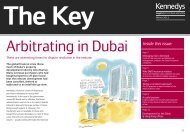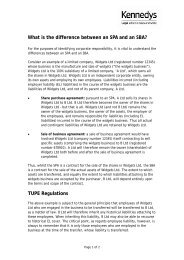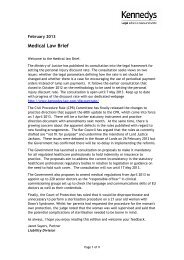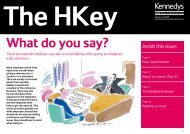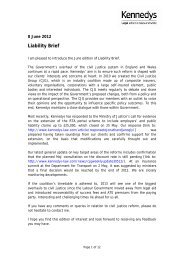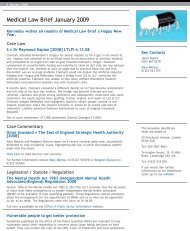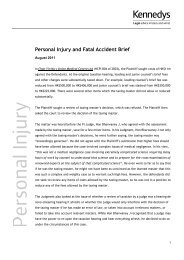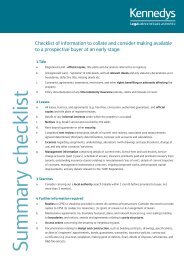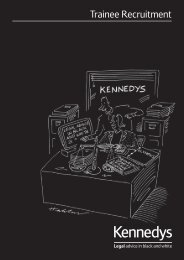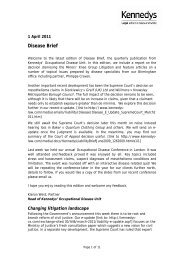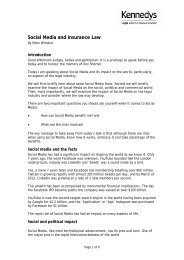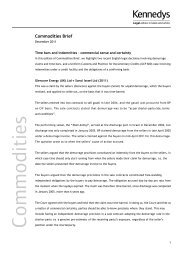Download Hong Kong Key - Summer 2009 (PDF, 256KB). - Kennedys
Download Hong Kong Key - Summer 2009 (PDF, 256KB). - Kennedys
Download Hong Kong Key - Summer 2009 (PDF, 256KB). - Kennedys
You also want an ePaper? Increase the reach of your titles
YUMPU automatically turns print PDFs into web optimized ePapers that Google loves.
The jeweller<br />
Insureds need to be careful if they wish to successfully make a<br />
claim under a policy.<br />
This article examines the recent Court of<br />
Appeal decision of Richfine Development<br />
Ltd t/a Keng Fai Jewellery v Hugh Rupert<br />
Rivington [<strong>2009</strong>] HKCU 583 which<br />
discusses warranty breaches and waivers<br />
of a Lloyds jewellers’ block policy.<br />
When the Policy became due for renewal, Anglo’s<br />
agent visited the office premises of Richfine with a<br />
pre-completed proposal form. During the meeting,<br />
Richfine’s director informed Anglo’s agent that Richfine<br />
was stocking 50% less gold than what was listed in the<br />
original Policy. Anglo’s agent assured the director that<br />
there was no need to amend the proposal form as gold<br />
trading posed less risk and renewed the Policy based<br />
Background<br />
Richfine Development Ltd (Richfine) operated a<br />
on the information provided when the Policy was first<br />
entered into in 1998 (the Renewed Policy).<br />
wholesale jewellery business which took out a Lloyds<br />
jewellers’ block policy with Lloyds Syndicate (HRR),<br />
through a <strong>Hong</strong> <strong>Kong</strong> agent, Anglo East Surety<br />
Limited (Anglo). A jewellers’ block policy is an “all<br />
risk” coverage for hazards and risks involved in the<br />
jewellery industry. As with all policies, the Insurer is<br />
required to list out exclusions for coverage. Typical<br />
risks that are covered in such policies include burglary,<br />
robbery, shoplifting, grab and run, fire and accidental<br />
damage.<br />
The claim<br />
Richfine later made a claim under the Renewal Policy<br />
in the sum of HK$6,199,343 for consequential<br />
loss suffered as a result of a robbery. HRR refused<br />
to pay the claim on the basis that Richfine had<br />
breached a warranty contained in a ‘basis’ clause<br />
of the proposal form which related to the agreed<br />
standards of transactional record keeping. HRR<br />
alleged that “[Richfine]’s records were inadequate…<br />
[Richfine] could not satisfactorily justify any element<br />
Court of first<br />
instance decision<br />
The crux of the issue was<br />
what constituted a ‘proper<br />
record’. At first instance,<br />
the court, taking into<br />
The entering of the policy<br />
In order to facilitate obtaining insurance coverage,<br />
at least two meetings took place between a<br />
representative from Anglo and a director from<br />
Richfine. Thereafter, the director took out policy cover<br />
on behalf of Richfine via Anglo, with HRR for a period<br />
of one year in 1998 (the Policy).<br />
of its claim by producing sufficient contemporary<br />
records supported by invoices and purchase notes…<br />
[Richfine] did not keep proper records… [Richfine]<br />
has been in breach of warranty from the date of the<br />
Proposal Form. Therefore, the policy never incepted<br />
and as a consequence [Lloyds] was never on risk…”.<br />
Accompanying the letter of rejection was a cheque in<br />
the sum of HK$46,700, being the insurance premium<br />
for the Renewal Policy.<br />
consideration the relative<br />
size, family-run nature<br />
and operational practices of Richfine, concluded that<br />
the record keeping methods were “appropriate to the<br />
prevailing circumstances” and held that no warranty<br />
had been breached. The Court of First Instance also held<br />
that the policy was valid because proper record keeping<br />
was not a warranty or condition precedent to liability.<br />
Even if it were a warranty, Anglo, having inspected the<br />
accounting papers, invoices and other documents and<br />
having indicated that Richfine’s related keeping system<br />
was satisfactory when the Policy was entered into, and<br />
being aware that the original system was in operation<br />
and made no indication that this was unsatisfactory<br />
when the Policy was renewed, Anglo (as the Insured’s<br />
agent) had waived any breach of warranty brought<br />
about by Richfine’s substandard record keeping.<br />
6



